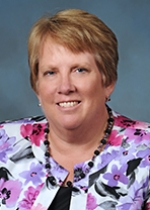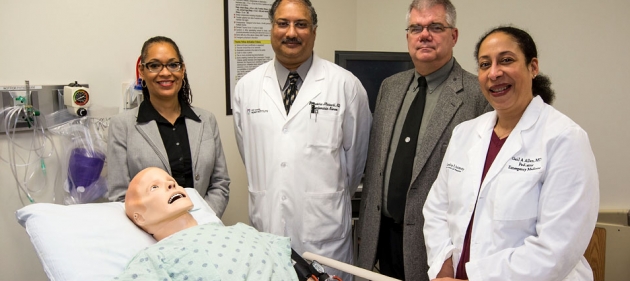A group of East Carolina University faculty members will spend the next 12 months exploring ways to educate students about patient safety, quality improvement and team-based care along with new ways of teaching that engage students more actively in their own education.
The 38 participants in the Teachers of Quality Academy will undergo advanced training in those areas and develop projects to apply these skills across the health sciences division and train students and other caregivers in these concepts.
The TQA is part of the American Medical Association's Accelerating Change in Medical Education Initiative. The Brody School of Medicine is one of 11 medical schools nationwide that received grants through the program to change the way medical education is taught.
Read more about the grant.
ECU calls its program Redesigning Education to Accelerate Change in Healthcare, or REACH.
"The first component is training the teachers who are going to be developing this new curriculum," said Dr. Elizabeth Baxley, senior associate dean for academic affairs at the Brody School of Medicine. "More and more in medical education and higher education, it's not about lecture-based education, it's how do you design a more meaningful learning experience."
The group comprises faculty members from the Brody School of Medicine, College of Nursing and the College of Allied Health Sciences plus medical residents. Faculty members from the School of Dental Medicine are likely to participate in future years, Baxley said.
Instructors include Brody faculty members and professors from ECU's main campus, such as College of Engineering and College of Education faculty members, as well as experts from Vidant Health and invited national level speakers.
"Turns out as we started looking there's a lot of expertise in our own backyard," Baxley said.
At the end of the year, participants will receive a credential in medical education from the ECU College of Education. Continuing education credits are also possible.
Dr. Danielle Walsh, a pediatric surgeon and associate professor, is part of the REACH Project Team and helped develop the TQA. She said the focus will be on improving quality, increasing value and measuring results.
She said government and private insurance payers are requiring health care professionals to increase the quality and outcomes of the care they provide. "The purpose of this TQA is ... to assess how well we're doing what we're doing and providing value to those we're serving," she said.
The emphasis will be to prepare faculty members to teach quality improvement, patient safety and system analysis competencies to students while also fostering interprofessional contact and understanding, said Dr. Harry Adams, a longtime professor of medicine and a TQA participant.
"We need to focus on improving the quality of care and safety issues," Adams said. "That's really never been part of the medical school curriculum at places I have previously worked. We're trying to create a culture and change behaviors of people starting medical school."
When Adams received his medical degree in 1968, he said, doctors "kind of ordered everyone what to do. Now, medicine is being practiced as a team. We need to get the learners in situations where they interact with members of the team."
And while collaboration and interaction among the various medical professions has been talked about for years if not decades, actually doing it is a logistical challenge.
"It is difficult," Adams said. "We all have different curricula and we're at different stages." For example, he said, nursing students are undergraduates while medical students are graduate students.
"It's going to involve some creative thinking," he said. Part of that could come from the varied backgrounds and levels of experience at ECU from the TQA participants, which Adams said ranges from "a few weeks to many years."
"It's good to have old folks like me, but you also need new ideas," he said. "The greater the diversity, the better it will be."
The result of the academy will be a redesigned medical curriculum that tackles safety, quality and interprofessional education and that could serve as a model for the nation's other medical schools.
"Brody is leading the way, and that is very exciting," said Dr. Herb Garrison, a professor of emergency medicine and a co-investigator on the REACH grant.
More information about ECU's REACH program is online at
http://www.ecu.edu/reach.
























